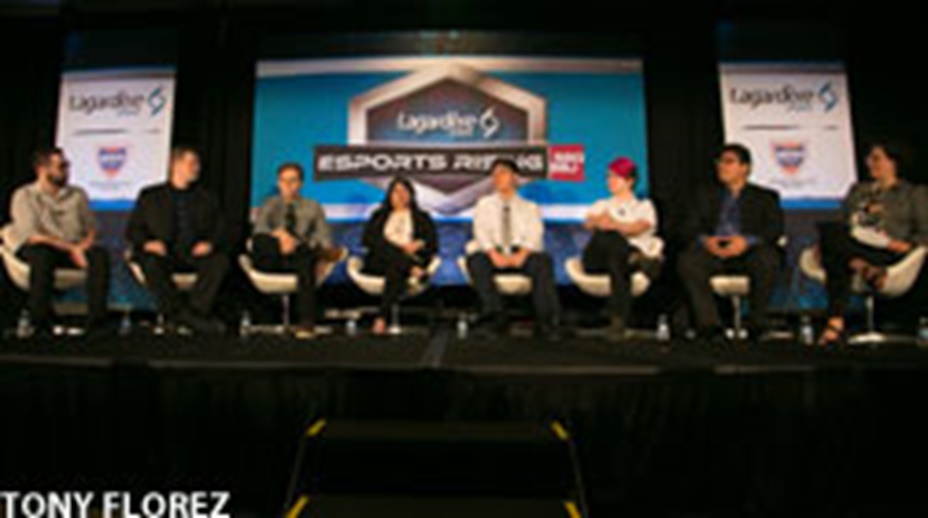Stakeholders and advertisers were treated to a lively discussion that served as a focus group of sorts, consisting of motivated esports players and on-campus tournament organizers who sat on a fan panel at the inaugural Lagardere Sports esports Rising conference. The panelists ranged in age from 19-33 and were either undergraduate or graduate students at a range of universities representing both coasts. They all grew up gaming and now spend much of their time playing, watching, and interacting with esports and the gaming community. “I’m a lifelong lover of sports and video games,” said Justin Surber, who is pursuing his MBA at the Univ. of Oregon’s Warsaw Sports Marketing Center and is focusing on esports. “They were separate things before esports. Then one day my friend said these guys are playing video games for money and it’s competitive. I came to Oregon to study it even further.” UMass student Alexander Chin said he began playing esports in sixth grade and noticed that the older guys he played with got into MIT, Stanford and Harvard. “I thought, maybe if I play League of Legends as well as them, maybe I can get into a good school,” he said. Playing esports well may not necessarily get a student into Harvard, although there are now scholarships at some colleges. UC-Irvine student Damian Maciej Rosiak said his school was the first public university to offer esports scholarships. And now, he said, “70% of students self-identify as gamers. We have the largest gaming club at a public university and the president is more than happy to connect us to sponsors.”
SWIMMING IN THE STREAM: These young gamers highlighted notable differences between traditional sports and esports. UC-Irvine student Jessamyn Delarmente Acebes: “The loyalty is more closely tied to the player than the team. You follow (a player’s) stream schedule, follow them on Twitch. Instead of watching an episode of Riverdale, you watch an (esports) stream. It eats into some of my other hobbies I guess.” Chin chimed in: “League of Legends is a part of our life, so instead of watching the basketball game at 8 p.m., we watch the League of Legends tournament at 4 a.m.”
PRICELESS EXPERIENCE, BUT KEEP THE STREAMS FREE: The gamers across the board said paying to see live events is generally a great value since tickets are priced below other pro sports contests and, as Orange Coast College student Adam Nelson said, gamers “want to meet the rest of their community they love.” Univ. of Oregon student Will McGirl added, “Watching League of Legends live in Madison Square Garden is one of the best sports experiences I’ve had. It blows the traditional sports experience out of the water sometimes.” But McGirl and the rest of the panel were unanimous in their adamant opposition to seeing streaming and gaming services creating pay walls or PPV of big events. They said paying for live events is worth it, but not so much for online viewing. Surber: “My spending habits are all in the game. I don’t pay to watch on Twitch, I may pay to go to a live tournament… I’m okay with sponsors that make it a better experience and make it more fun for me to watch. As far as me shelling out $10-$15 to watch, I’m not going to do that.” Nelson agreed: “The mistake is barring it up after it’s been free so long. The moment you create a barrier and have your name behind it, that’s not good. Everyone in the community will remember that name. The internet is not forgiving and neither are the players.”
THE DARK SIDE: The panel also touched on the “dark side” of esports: cyber bullying. Orange Coast College student Jonathan Barajas said, “Because the (esports) community is violent -- not physically, but keyboard warriors -- (women gamers) shy away from tournaments because they fear when they go to an event that will be the same situation (getting bullied in person).” Acebes, the lone female on the panel, added, “Gatekeeping is the biggest issue. You join a game and someone finds out you’re a female, and then everything you do is criticized. ... Online and in person I’ve seen people trash talk not because of skill but because of whatever you identify as. For branding, having an ambassador reaching out to me made a difference. The biggest thing brands can do is seek out people at tournaments who are being left alone.”
For more coverage of the business of esports, visit our partners, esportsobserver.com.




